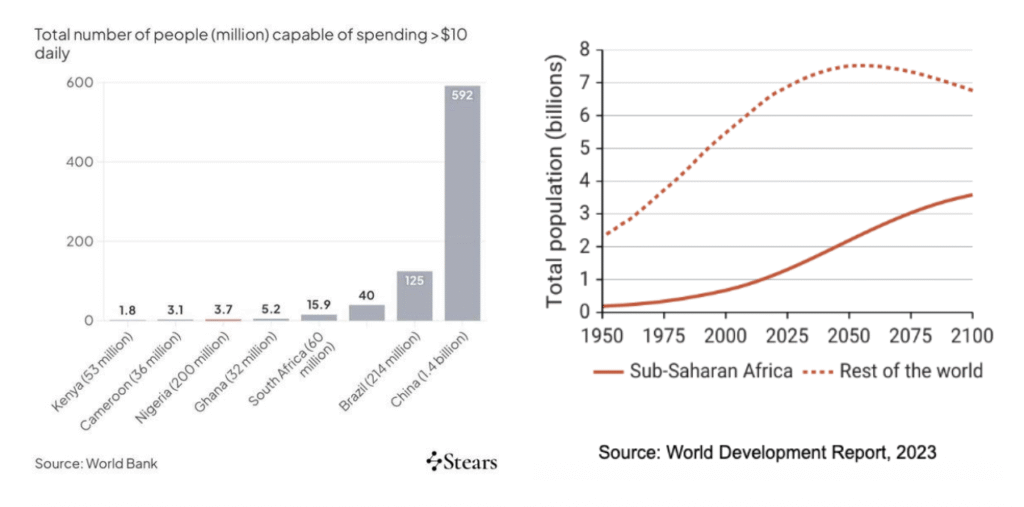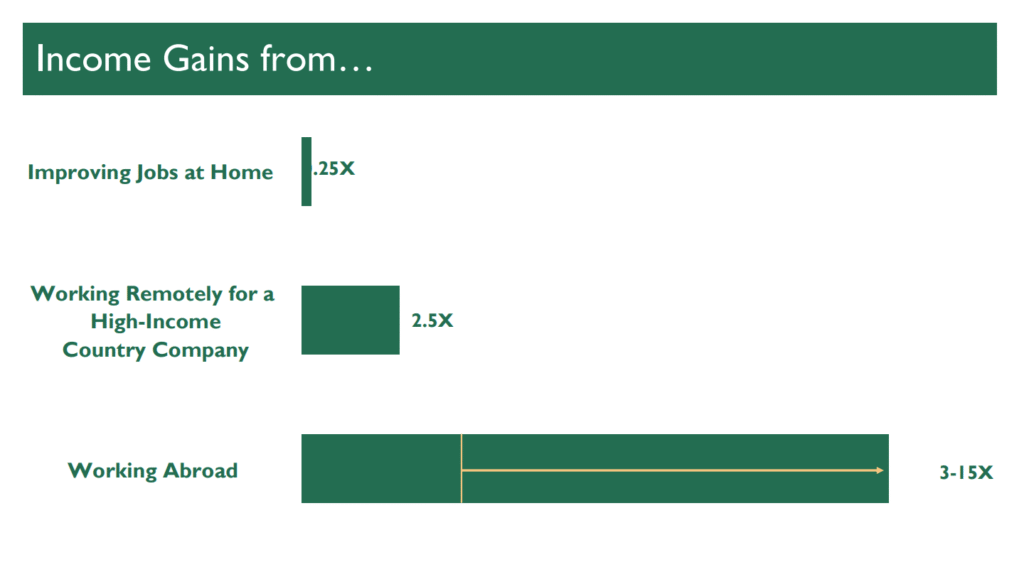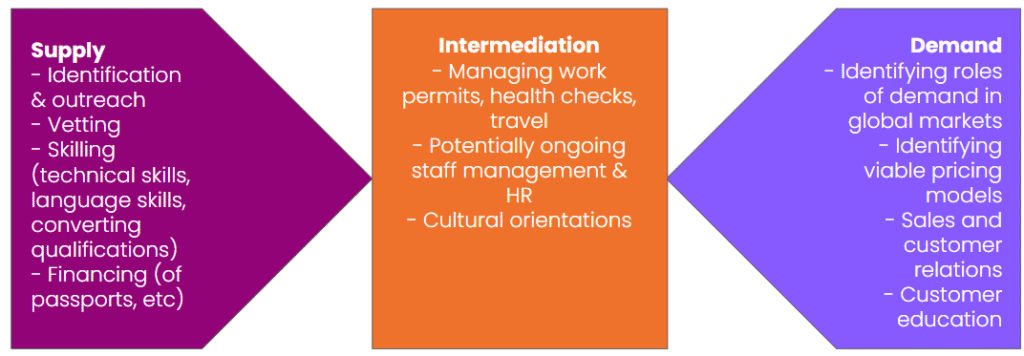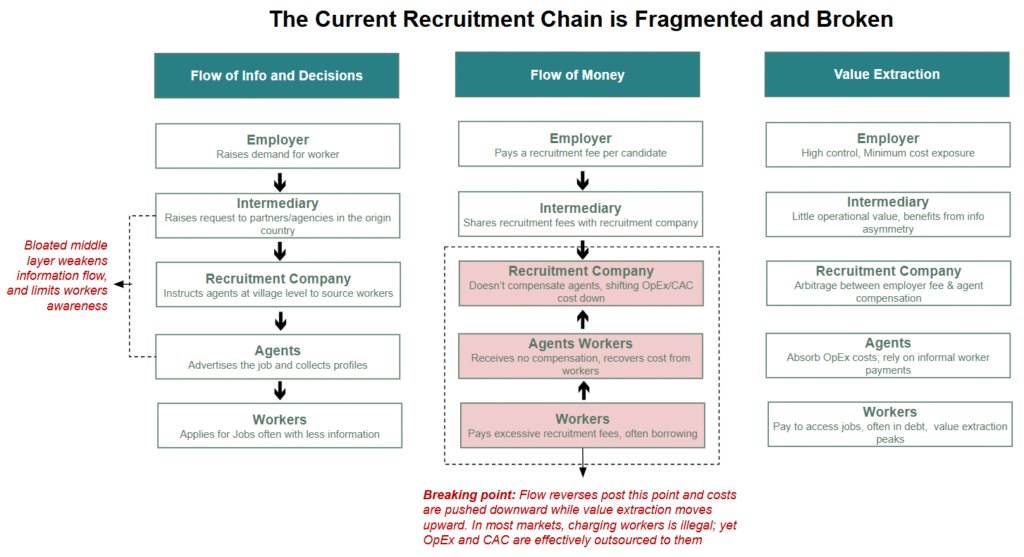By Chris Maclay and Garvit Goswami
Two of the newest platforms in our venture support portfolio, AEDILO and Velocity, are taking very different—but similarly effective—approaches to facilitating labour mobility for young Africans. We are currently looking to widen our understanding of the labour mobility-focused jobtech ecosystem with our Cross-Border Jobs Startup Competition that runs until the end of October.
The opportunity
We first wrote about labour mobility at the Jobtech Alliance a year ago — explaining why we need to look beyond Africa. It felt controversial at the time. While huge effort needed to be placed on domestic job creation across African countries, the fundamentals of African demographic trends suggest that—for the coming years at least—there would not be enough quality jobs produced on the continent. In sub-Saharan Africa alone, 10-12 million young people join the labour market annually, but only 3 million formal sector jobs are created.
Purchasing power on the continent remains weak, which means that demand for labour is ultimately constrained.

Above: Two stories, one solution? Limited disposable income in Sub-Saharan Africa, and the fact that the African population will continue to grow for the rest of the century, while the rest of the world slows down.
There has never been a time when global demographics looked so different. If you randomly bump into a person in the Global North today, they are very likely to be a 45-year-old with tertiary education and earning several times more than the global median income. The same exercise in sub-Saharan Africa would most likely let you encounter a 19-year-old with only secondary or lower education and earning just a fraction of that income. These demographic contrasts are already reshaping the global labour market. Europe alone is projected to face a shortage of around 95 million workers by 2050. This labour market deficit stands in stark contrast to Africa’s young labour surplus, which is probably in one of its most expansive stages. For example, there are currently more than 700,000 unfilled vacancies in Germany alone, particularly in sectors like nursing and ICT, while the Gulf states continue to import the majority of their labour, from hospitality to construction.
African talent is young and eager to work, and global demand is rising, but the systems to connect Africa’s untapped talent supply of young workers with global demand remain broken, risky, politically sensitive and underinvested in.
One solution is to explore the potential role of global migration and labour mobility as a tool for job creation for young Africans. When labour migration works, its impact is extraordinary. A move from a low-income to a high-income country can increase a worker’s income 15-fold within just one year.

Source: Labour Mobility Partnerships (LaMP)
The ripple effects extend far beyond the individual: families benefit through better education, healthcare, housing, and stability, while workers’ communities gain directly from remittances and indirectly returning skills. If managed well, migration might be one of the most powerful tools we have to expand opportunities.
The risks
Many migrant workers fall into the hands of brokers who charge huge upfront fees with little transparency. Recruitment – particularly along certain corridors such as to the Gulf – is mostly informal, contracts are unclear, and protections are weak. The result is not that people stop moving, but their movement becomes riskier.
There are countless accounts of violence towards vulnerable migrations and dishonest brokers putting young Africans at risk, and most precarious workers’ voices are never heard.
It doesn’t have to be this way; labour mobility for young Africans can become safer, clearer, and more affordable. With new job corridors opening and technology expanding, platforms do have a chance to build systems that make cross-border work safe, transparent, and fair. As our upcoming (January 2026) sector scan on jobtech and labour mobility will demonstrate, platforms will need to be built for the unique challenges of the corridors, sectors and the migrant groups they work with.
These challenges could exist at the location of demand (destination markets), supply (departure markets) or in the process of facilitating the movement between the two.

We believe that jobtech platforms are well-positioned to contribute to solutions in the labour mobility space across all three.
Two solid solutions to labour mobility for young Africans
We are currently working with two very different, early stage platforms enabling labour mobility for young Africans. AEDILO is a digital recruitment platform for overseas workers, improving the conditions and quality of blue collar labour mobility between Africa and the Gulf, while Velocity fills critical language skills gaps to connect skilled professionals (initially Kenyan healthcare workers) with employers in Europe.
| Corridor (current) | Sector (current) | Entry point | |
| East Africa -> Gulf States | Blue collar and hospitality | Optimum employers | |
| Kenya -> Germany | Nursing | Language gaps |
AEDILO is looking for quality employers in the Gulf
AEDILO is focused on improving standards, quality, and access in a migration corridor that is fraught with challenges. There are estimated to be over a million East Africans working in the Gulf states. While we estimate that these workers are likely to send home billions of dollars in remittances each year, the economic deadweight losses are simply staggering: .From speaking to dozens of East African Workers in the Gulf it has become clear that usury fees to agencies and middlemen amount to KES 180,000-220,000. Given that most aspiring Workers are credit constrained they either take out loans from informal lenders or sell previous assets like land to finance these fees, layering on top additional cost. As a consequence, most of the savings of the first year in the new job are being consumed to pay back liabilities related to upfront fees. Removing these fees and instead leveraging the earnings uplift to channel them in assets such as a home or life improvement such as better education would unleash the full benefits of Workers moving abroad.
While it is illegal in most countries for labour migrants to pay to secure a job, this long and fragmented supply chain of labour enables a system to exist where job seekers pay local recruiters who then pay agents rather than recruitment finances flowing the other way.

Migrants typically need to take out significant loans in order to pay these fees up front, which often leave them stuck in unsatisfactory roles. Meanwhile, cartel-like recruitment companies, agents and intermediaries extract all of the value. In addition, roles that come through this informal network often lack the legal paperwork in the host country, creating perilous situations for workers who are then easily exploited.
Based on this, AEDILO has identified the key challenge across GCC labour pathways: unclear compliance standards, informal recruitment practices, and a disrupted equilibrium between genuine demand and reliable supply. A strong model for the GCC, therefore, is premised on building trusted pipelines to the right employers, ensuring that ethical recruitment aligns with the market’s real labour needs. This leaves a huge opportunity for a platform such as AEDILO to engage optimum employers who are willing to pay fair recruitment fees for quality workers. By removing the multiple levels of extractive middlemen, even more benefits can reach the workers.
AEDILO believes that there are strong tailwinds which leave significant opportunity to improve the conditions of labour mobility to the Gulf. Many employers there are keen to improve their recruitment practices, given negative publicity, but do not know where to begin. Moreover, some Gulf states are looking to diversify their labour force through active recruitment specifically within Africa. Employers are also increasingly recognising that through intermediaries, they are not getting the best workers, but the ones who have paid the most to secure the position.
AEDILO is currently focused on motorbike delivery riders, who anecdotally number in the hundreds of thousands in the Gulf states today. This focus aligns with a growing shift in the region: as the UAE government pushes to diversify its workforce beyond South Asia, large employers are increasingly seeking trusted recruitment partners in Africa. This creates a strong opening for AEDILO to redesign the recruitment chain from the ground up — improving transparency, compliance, and efficiency in connecting African workers to high-demand roles in the Gulf. As a platform for recruitment, AEDILO is also able to leverage worker data from Africa-based jobtech platforms—say, performance history in an Africa-based ride hailing platform, this potentially helps as proof for quality of workers.
But there remains a challenge around financing. Many candidates struggle to cover basic migration costs like passports, certifications, and travel. The goal for AEDILO, hence, is also to bridge this gap through embedded worker financing, allowing the platform to front these costs at fair, sustainable terms, while also keeping positive unit economics even before employers start paying recruitment fees.
From there, AEDILO’S playbook is clear: securing fixed monthly recruitment volumes, and investing in local operations and skill-testing partnerships. But the key is also to demonstrate value to employers because many of them are already using the existing agencies, which are usually unable to match the optimal demand with supply. AEDILO aims to do this through higher-quality and better-retained workers, and that is why a lot of the focus is also on skilling and compliance.
Once employers start seeing that difference, the conversation shifts — AEDILO can begin negotiating fair recruitment fees, gradually moving the system from worker-pays to employer-pays. With access to low-cost donor capital or early financing support, this model could scale rapidly, unlocking ethical recruitment at both volume and value.
Velocity is focusing on language gaps
Velocity takes a very different approach by selling a particular skills gap as its anchor.
The nursing industry has for many years represented the prime sector for skilled labour mobility globally. Over a quarter of the UK’s 800,000+ nurses, midwives and nursing associates come from outside of the UK, with India and the Philippines accounting for half the number. Germany, with its well documented ageing population, is in desperate need of more nurses. Recognising this labour shortfall, the governments of Germany and Kenya have created a framework agreement for labour mobility between the two countries.
There is one major challenge though: language. There are close to no German speakers in, say, India or the Philippines. The pool of global nurses, who are fully equipped to start a new role in Germany in a sector that is centred on human interaction, is small.
Duolingo only goes so far, and though the number of local German language instructors is growing in a country like Kenya, these courses can cost thousands of dollars, need to be paid in advance, and offer no guarantees that a job in Germany will be secured after. As we’ve written about elsewhere, a cyclical challenge with skilling for work in Africa is that it requires capital to get skilled for the jobs that exist, but capital is specifically what unemployed young Africans lack as they don’t have the jobs in the first place.
Velocity addresses the critical language gap that limits African nurses from accessing regulated healthcare roles in Europe. Through its AI-powered German language platform, nurses can learn flexibly online at a fraction of traditional costs, progressing toward internationally recognised certifications. This approach is in line with our hypothesis that labour mobility-oriented platforms will have to adjust their business proposition based on the corridor and sectors they are operating in.
Velocity’s tech-driven model doesn’t just ‘do language training’. The platform tracks learner progress, manages placement readiness, and even has language training financing solutions such as through Income Share Agreements (ISAs) with partners like Chancen International. Most importantly, Velocity’s platform then matches learners completing learning to the desired standard to roles through accredited German partners such as Deraja, Terratalent, and TERN. This integrated approach turns what was once a costly, uncertain process into a structured and affordable route to global employment, while helping European hospitals address their urgent workforce shortages. In terms of their business models, most of the revenue comes from placement partnerships where German agencies pay a per candidate fee upon successful hiring. Learners’ subscription is another income channel. Future revenue streams might include in-app services such as remittance facilitation, forex, and insurance looking to create a holistic ecosystem around ethical migration.
Although Velocity is trying to build a safer and fairer pathway for African nurses, the nursing sector is marked by sensitivity, given the risk of facilitating the exodus of skilled healthcare workers from countries that already have ill-equipped healthcare systems. This is a critical concern, and one that needs to be closely monitored, but current evidence doesn’t fully back the brain drain hypothesis. For example, in the Philippines, for every nurse who left to work abroad, nine more were trained and stayed behind. The prospect of better wages abroad for the same jobs has spurred investment in training locally. Migration, in this case, didn’t drain talent but it multiplied it.
What’s next
AEDILO and Velocity are both very early-stage — a good indicator of how nascent this sector is, and how much space there is for exploration and innovation. At the Jobtech Alliance, we look forward to seeing how their solutions evolve. We are also actively seeking to widen our understanding of the migration-focused jobtech ecosystem with our Cross-Border Jobs Startup Competition.
As we always say at the Jobtech Alliance, we are not jobtech evangelists. Nor are we labour mobility evangelists. We see potential and pitfalls in both spaces. Putting them together only multiplies these risks and opportunities. We do have a firm belief that by proactively identifying the greatest opportunities for quality job creation, platforms like AEDILO and Velocity can shape this critical path for job creation in Africa for the better.
With population demographics likely to make Africa the labour basket of the world over the coming half-century, either we develop safer and better quality pathways for labour mobility, or the problematic status quo comes to define the future too.

0 Comments